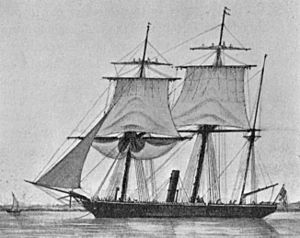HMS Sparrowhawk (1856) facts for kids

Sparrowhawk's sister-ship, Surprise
|
|
Quick facts for kids History |
|
|---|---|
| Name | HMS Sparrowhawk |
| Ordered | 26 July 1855 |
| Builder |
|
| Laid down | 6 August 1855 |
| Launched | 9 February 1856 |
| Completed | By 7 April 1856 |
| Fate | Sold in 1872 |
| General characteristics | |
| Class and type | Vigilant-class second-class despatch/gunvessel |
| Displacement | 860 tons |
| Tons burthen | 669 79/94 bm |
| Length |
|
| Beam | 28 ft 4 in (8.6 m) |
| Draught | 8 ft (2.4 m) (designed) |
| Depth of hold | 14 ft (4.27 m) |
| Installed power |
|
| Propulsion |
|
| Sail plan | Barque-rigged |
| Speed | 11 kn (20 km/h) under steam |
| Complement | 80 |
| Armament |
|
HMS Sparrowhawk was a special kind of ship called a gunvessel. It was part of the Vigilant-class and was launched on February 9, 1856, in Limehouse, England. This ship sailed in many places, especially in the Far East. Later, around 1865, its sails were changed to a three-masted barque style. Sparrowhawk was sold in 1872 and became a merchant sailing ship. After that, it was used to carry coal in Australia.
Contents
Ship Design and Purpose
The Vigilant-class ships, like Sparrowhawk, were built as "second-class despatch and gunvessels". This means they were designed to carry messages quickly and to fight close to shore. They were especially useful during the Crimean War. These ships were bigger versions of an earlier type of gunvessel, the Arrow-class.
Engine Power
Sparrowhawk had a two-cylinder steam engine built by Humphrys, Tennant and Dykes. This engine provided 726 indicated horsepower (541 kW) of power. It turned a single propeller, allowing the ship to reach a top speed of about 11 knots (about 20 kilometers per hour) using steam.
Sail Plan
All ships in the Vigilant-class, including Sparrowhawk, were rigged as barques. This means they had three or more masts, with certain types of sails on each.
Ship's Weapons
Even though Sparrowhawk was planned to have two 68-pounder Lancaster guns, it ended up with different weapons. When it was finished, it had one 7-inch (110-pound) Armstrong gun that loaded from the back. It also had one 68-pound Lancaster gun that loaded from the front. Plus, it carried two 20-pounder guns that loaded from the back.
Sparrowhawk Service History
Porcher Island, which is near Prince Rupert, British Columbia, is named after Edwin Augustus Porcher. He was the captain of HMS Sparrowhawk from 1865 to 1868. During this time, the ship was based at Esquimalt Naval Base on Vancouver Island.
While serving with the North Pacific Squadron, Commander Porcher took Sparrowhawk on four summer trips. These voyages were to the North Coast of British Columbia. He made these trips in 1866, 1867, and twice in 1868.
Sale and Later Life
Sparrowhawk was sold at an auction in Esquimalt on November 20, 1872. It was bought by Corbett and Company from Portland, Oregon, for about £4,000. The ship's engines were later used to power a sawmill owned by Sewell Moody in Moodyville, British Columbia.
In 1873, the ship was officially registered as a 3-masted sailing barque. It was listed at the port of Victoria, British Columbia. In 1876, Sparrowhawk was sold again to William Morley of Melbourne, Australia. He used it for his business of carrying coal along the coast. After Morley passed away in 1877, his business, including the ship, was put up for sale.
In June 1878, Huddart Parker and Company bought the business. By 1881, Sparrowhawk was no longer used as a full ship. Instead, it was turned into a "coal lighter," which is a type of barge used to carry coal.
On April 7, 1892, while Sparrowhawk was docked in Melbourne, another ship called Flinders crashed into it. Sparrowhawk sank in the Yarra River. However, it was pulled out of the water, fixed, and later used by Jeremiah O'Sullivan. In 1917, Sparrowhawk was officially removed from the ship register. This was because it had been taken apart and broken up in the Saltwater River at a time that is not known.

